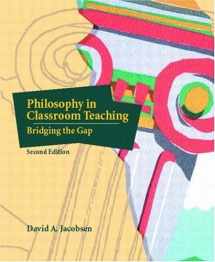
Philosophy in Classroom Teaching: Bridging the Gap (2nd Edition)
Book details
Summary
Description
It's an often-asked question: “How do I use educational philosophy in my classroom teaching?” This book is a comprehensive answer. To clearly establish the applicability of philosophy to classroom teaching, this book presents the basics of philosophy; examines all of the major educational philosophies—idealism, realism, pragmatism, existentialism, and post-modernism—and their main proponents; and provides readers with a thorough knowledge of each philosophy's fundamental discourse around education. To this theoretical framework are then added real scenarios from real classrooms that demonstrate just how these erudite explorations translate into actual, in-front-of-the-children teaching. Discussion of life, times, and views of several philosophers—Pestalozzi, Whitehead, Russell, Apple, Giroux; and the feminists Wollstonecraft, Addams, Martin, and Hooks—introduce learners to a wide range of philosophies and philosophers including challenging and controversial ideas and people. Coverage of current and relevant topics—behaviorist learning theories, constructivist learning theories, and the application of philosophy in the new millennium—create an awareness of the most up-to-date thinking in the field.


We would LOVE it if you could help us and other readers by reviewing the book
Book review



